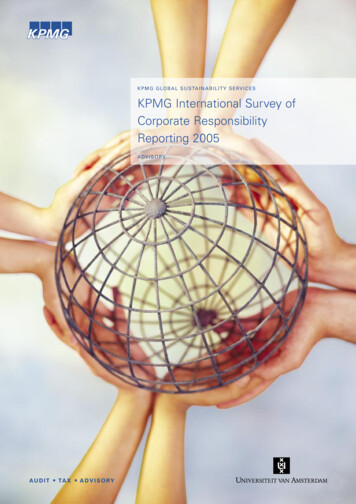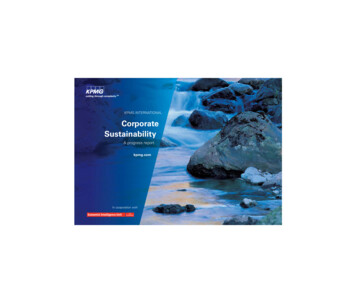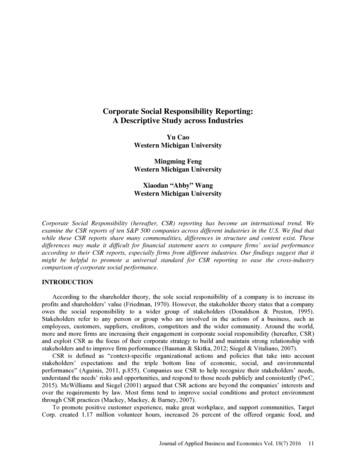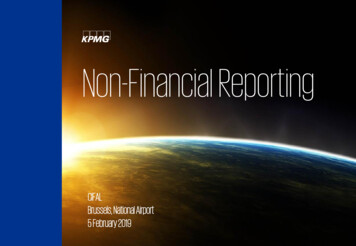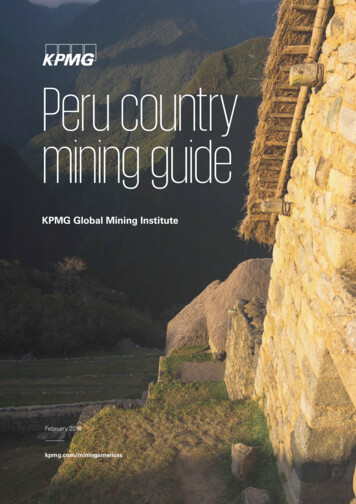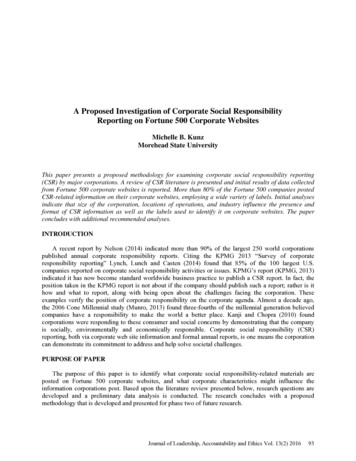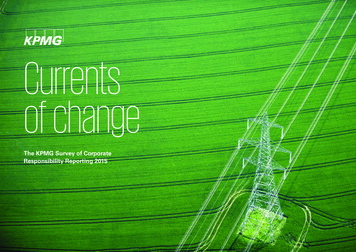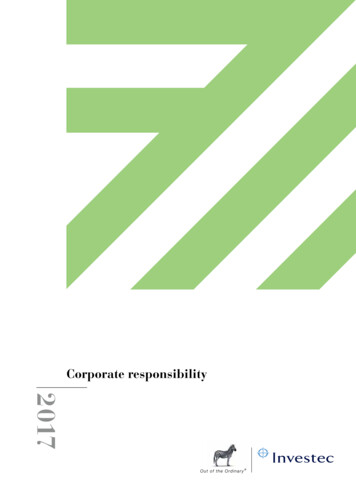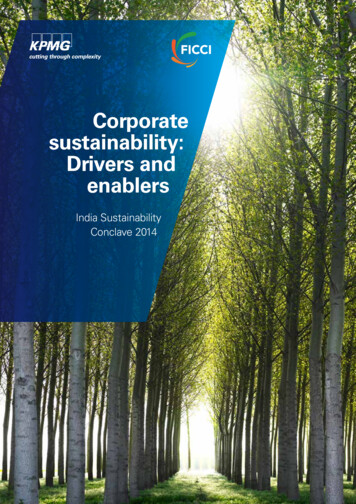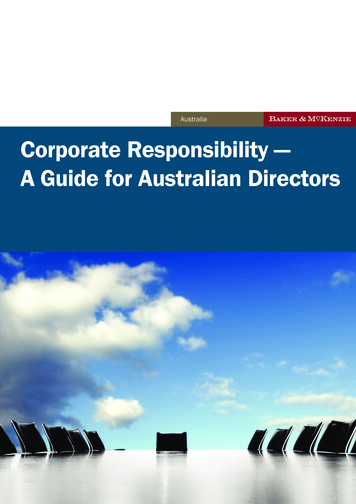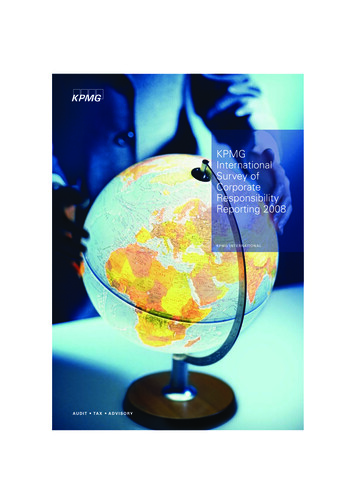
Transcription
105984 Corp responsibility Survey FULL23/10/0814:09Page c1KPMGInternationalSurvey ofCorporateResponsibilityReporting 2008K P M G I NT E R N AT I O N A L
ContentsForeword1Lord Michael Hastings of Scarisbrick CBE, Global Head of Citizenshipand Diversity, KPMG InternationalWim Bartels, Global Head, KPMG Sustainability Services,Partner, KPMG in the Netherlands22Executive Summary36Quick Reference GuideChapter 1 Corporate Responsibility Reporting in Context7891.1 Looking back1.2 Looking aheadChapter 2 About the Survey2.1 Objectives2.2 Methodology111212Chapter 3 The State of Corporate ResponsibilityReporting in 2008133.13.23.33.414151718Corporate Responsibility Reporting at the Global LevelA Closer Look at Reporting in 22 CountriesIntegration of Corporate Responsibility Information into Annual ReportsBeyond the Trend Line: Drivers for ReportingChapter 4 Corporate Responsibility Strategyand Reporting Process214.1 Strategy and Objectives4.2 Management and Frameworks4.3 Stakeholder Engagement222831Special Focus Investor Relations334.4 Reporting and the Use of Standards35Special Focus Global Reporting Initiative Guidelines36Chapter 5 Topics in Corporate Responsibility Reporting414246495.1 Corporate Governance5.2 Supply Chain5.3 Climate ChangeChapter 6 Assurance and Corporate Responsibility Reporting6.16.26.36.4Global Trends in AssuranceA Closer Look at Assurance by Country and SectorAssurance: Why, Who and WhatAssurance Standards and OpinionsSpotlight (by country)555657626567The Way Forward109Appendices111112113113114IIIIIIIVList of Tables and FiguresList of TermsKey ContributorsKPMG’s Global Sustainability Services key contact information 2008 KPMG International. KPMG International provides no client services and is a Swiss cooperative with which the independent member firms of the KPMG network are affiliated.
1 KPMG International Survey of Corporate Responsibility Reporting 2008Foreword 2008 KPMG International. KPMG International provides no client services and is a Swiss cooperative with which the independent member firms of the KPMG network are affiliated.
KPMG International Survey of Corporate Responsibility Reporting 2008 2Today we are in the midst of a rapidglobal transformation with increaseddemand on corporations to performnot only financially but to be goodcorporate citizens. One of the mostimportant aspects of this transformationis the critical importance CorporateSocial Responsibility (CSR) programs.Climate change; community health,education and development; andbusiness sustainability are some of themost pressing issues of our time.Businesses are increasingly involved inthese areas as are their clients and theirpeople. This raises the importance ofaccurately and transparently accountingfor and reporting these activities.Auditors have long played an importantrole in the financial reporting processand we believe strongly in the strategicvalue of CSR reporting. We want useour leadership position in this area toIn a world of changing expectations,companies must account for the waythey impact the communities andenvironments where they operate.It is encouraging to see that nearly80 percent of the world’s largest250 companies are now doingprecisely this - reporting on theirsocial and environmental performance.But would these reports pass the“greenwash” test? For the first time inthe 15 years we have been doing thissurvey, we think they just might.Nearly all of the Global 250 companiesthat report also publish a corporateresponsibility strategy with definedobjectives. Our findings show thatmanagement systems are maturing,help develop this field and promotebest practices by highlighting currentdevelopments and historical trends.KPMG conducts the InternationalSurvey of Corporate ResponsibilityReporting every three years to gaininsight into CSR reporting and tocontribute to the evolving globaldialogue on transparency andaccountability. The 2008 survey wasconducted in 22 countries and withmore than 2200 businesses around theworld.As you will see in the results, therehas been an important shift in thisdirection with CSR reporting becomingthe norm instead of the exceptionwithin the world’s largest companies.Three years ago only 50 percent ofcompanies surveyed included CSR intheir reporting, in this survey theand that reporting is likely the result ofa systematic approach to corporateresponsibility that includes a strategy,management system, stakeholderengagement, reporting, and assurance.But the true judges of a company’sreport quality are its readers - thecompany’s stakeholders. The KPMGsurvey was expanded this year to probethe depth of stakeholder involvementin a company’s corporate responsibilitystrategy and reporting. Althoughstakeholder engagement is becomingmore formalized, there is still roomfor greater transparency about whostakeholders are and how companiesare responding to their concerns.number jumped to 80 percent. Morecompanies report the information as itrelates to specific objectives and morecompanies include this information intheir annual reports.Our goal is to further the ideal thatcorporate responsibility reporting andassurance practices become ascommonplace as financial reportingand assurance. I believe you will findthis report relevant to your businessand that it will stimulate your ideasand help facilitate your move to includeCSR in your overall reporting.Lord MichaelHastings ofScarisbrick CBEGlobal Head ofCitizenship and Diversity,KPMG InternationalIn terms of report quality, there is alsoa growing trend in using outside viewsto confirm a company's account of itscorporate responsibility performance.Third parties such as stakeholder panels,subject matter experts, and professionalassurance providers all have a role toplay in helping to ensure that credibleinformation guides companies onprogress toward what really matters:a more sustainable future.Wim BartelsGlobal Head,KPMG SustainabilityServicesPartner, KPMGin the Netherlands 2008 KPMG International. KPMG International provides no client services and is a Swiss cooperative with which the independent member firms of the KPMG network are affiliated.
3 KPMG International Survey of Corporate Responsibility Reporting 2008Executive SummaryThe purpose of this survey was to track reporting trends in the world’slargest companies. The sample of over 2200 companies includes theGlobal Fortune 250 (G250) and the 100 largest companies by revenue(N100) in 22 countries. The survey presents historical data where possible,drawing from five previous surveys conducted by KPMG firms since 1993.Only information available in the public domain was used for this survey,such as company websites, corporate responsibility reports,and annual reports issued in 2007-2008.More details on the survey methodology and the context for corporate responsibilityreporting can be found in Chapters 1 and 2. 2008 KPMG International. KPMG International provides no client services and is a Swiss cooperative with which the independent member firms of the KPMG network are affiliated.
KPMG International Survey of Corporate Responsibility Reporting 2008 4The State of Corporate Responsibility Reporting in 2008Chapter 3 provides an overviewof the main trends in reporting.One of the most significant findingsof the 2008 survey is that corporateresponsibility reporting has gonemainstream - nearly 80 percent ofthe largest 250 companies worldwideissued reports, up from about50 percent in 2005.National trendsNational level companies trail the G250with only 45 percent of the total sampleissuing reports, but numbers vary fromless than 20 percent in Mexico to morethan 90 percent in Japan.DriversEthical considerations and innovationemerged as some of the most commondrivers for reporting, while riskmanagement fell in the G250 group.KPMG InsightReporting is now the norm, not theexception, among the world’s largestcompanies. Since motivations forreporting have shifted away fromreactive and risk management factorsand toward aspirational andinnovative ones, we expect reportingto become more common at thenational level and in smallercompanies in the near future.Corporate Responsibility Strategy and Reporting ProcessChapter 4 looks at the process behind corporate responsibilityreporting and how reporting fits into a company’s overall strategyand management system.StrategyThree-quarters of G250 companies havea corporate responsibility strategy thatincludes defined objectives.FrameworksMore than three-quarters of the G250and nearly 70 percent of the N100 usethe GRI Guidelines for their reporting.StakeholdersNearly two-thirds of G250 companiesengage with their stakeholders in astructured way, up from 33 percentin 2005. However, most companiesdo not use existing channels like annualgeneral meetings (AGMs) to engageanalysts and investors aboutenvironmental and social issues.ValueMore than half of the world’s largest250 companies publicly disclose newbusiness growth opportunitiesand/or the financial value of corporateresponsibility.KPMG InsightAlthough the N100 companies aretrailing their global counterparts, weare seeing a distinctive maturing ofcorporate responsibility managementsystems overall. Reporting is nowmore likely to occur within thecontext of an overarching strategyand management system. The use ofthe GRI Guidelines by the majority ofG250 and N100 companies showsthat this has become a leadingstandard for reporting. Stakeholderengagement is an area that could bestrengthened - and included as partof a broad-ranging approach tocorporate responsibility strategy andreporting. Now that some of theworld’s largest companies have beenable to quantify the business case forcorporate responsibility and reporting,it is likely that the practice will spreadthrough countries and sectors to thesmaller players. 2008 KPMG International. KPMG International provides no client services and is a Swiss cooperative with which the independent member firms of the KPMG network are affiliated.
5 KPMG International Survey of Corporate Responsibility Reporting 2008Executive Summary continuedTopics in Corporate Responsibility ReportingChapter 5 looks inside reports to selected issues companies aredisclosing information on: corporate governance, supply chain,and climate change.Corporate governanceAlthough 92 percent of G250companies disclose a corporategovernance code of conduct or ethics,only 59 percent report on incidentsof non-compliance with the code.Supply chainNearly all G250 companies have asupply chain code of conduct, but onlyhalf disclose the details of how it isimplemented and monitored.Climate changeWhile 62 percent of G250 companiesdisclose information about climaterisks, 69 percent of N100 companiesdo not. Whereas understanding therisks starts with understanding thefootprint, a large part of the G250(41 percent) need to develop this.Carbon footprint reporting is focusedlargely on the own operations.KPMG InsightIn theory the link between corporategovernance and corporateresponsibility seems clear, but inpractice many companies do notappear to be making the connectionand capitalizing on the potentialbenefits. Reporting on supply chainrisk and reporting by suppliers bothlook set to increase as investors,and customers in particular, demandgreater responsibility andtransparency. Whereas carbonfootprint reporting is not as commonas might be expected, there are otherindications that companies are takingthe risks and opportunities associatedwith climate change seriously.Assurance and Corporate Responsibility ReportingChapter 6 examines trends in assurance and reveals who is using it,how, and why.Formal assuranceFormal third party assurance of G250reports jumped from 30 percent to 40percent in the past three years, andthe trend is similar at the national levelwith 39 percent of N100 reportscontaining formal assurance.Third party commentaryTwenty seven percent of reportsincluded other types of third partycommentary, such as stakeholderpanels or subject matter expertstatements.ProvidersMajor accountancy organizations arethe leading providers of assurancein corporate responsibility reporting.Standards and qualityThe consistency and quality ofassurance approaches is demonstratedby an increase in the use of standards.G250 companies are less likely to askfor reasonable (positive) assurancethan N100 companies.KPMG InsightAs stakeholders become morespecific about the information theyneed and corporate responsibilitymanagement systems mature,combining comments from partiessuch as stakeholder panels with asystematic assurance process couldprovide the desired level of assuranceabout both report content and quality.With the N100 group at par with theG250 in terms of using formalassurance (40 percent), this mayindicate that new reporting companieswill adopt this practice as standardprocedure over the next three years. 2008 KPMG International. KPMG International provides no client services and is a Swiss cooperative with which the independent member firms of the KPMG network are affiliated.
KPMG International Survey of Corporate Responsibility Reporting 2008 6Quick Reference GuideUse this navigator to jump quickly to topicsin the report that interest you.TopicPageTrends in G250 reporting14Trends in N100 reporting15Corporate responsibility strategy22Stakeholder engagement31GRI Guidelines35Corporate governance reporting42Supply chain reporting46Climate change reporting49Assurance55 2008 KPMG International. KPMG International provides no client services and is a Swiss cooperative with which the independent member firms of the KPMG network are affiliated.
7 KPMG International Survey of Corporate Responsibility Reporting 2008Chapter 1Corporate ResponsibilityReporting in ContextIn a world of ever changing challenges companies are shifting awayfrom risk management approaches and toward an approach that haslearning and innovation at its heart. Reporting is necessity if companiesare to know and understand their social and environmental impacts,and how to minimize the dangers and maximize the opportunitiesassociated with new and emerging challenges. 2008 KPMG International. KPMG International provides no client services and is a Swiss cooperative with which the independent member firms of the KPMG network are affiliated.
KPMG International Survey of Corporate Responsibility Reporting 2008 8Achieving robust economic growth andvitality in a way that does not hinderfuture generations from realizing thesesame goals is an urgent aspiration.Known as “sustainable development”this is possbily the main challenge ofour times. Historically governmentshave taken a lead role in shaping futuredirections through policy making andincentives. However, due to the rise ofeconomic power in the private sectorover the past half century, and increasedinterconnectivity brought about byglobalization over the past two decades,it has become clear that companieshave a major role to play in the pursuitof a more sustainable future.Companies can play a vital role byensuring that the direct and indirectimpacts caused in the normal courseof business are positive for theenvironment and people, and by usingtheir vast reserves of knowledge,innovation, creativity, and otherresources to help find solutions tosome of the social and environmentalchallenges we are facing as a globalsociety today or in the future. This isknown as corporate responsibility.There are two issues in particular,however, that make it difficult forcompanies to know how they shouldact in the face of such challenges,thus making sustainable developmenta moving target: Imperfect informationThe complexities of physical,biological, and social systems, andhow they interact and react understress or changing conditions, arenot fully known. Therefore companiesmay not know how they haveimpacted an ecosystem or communityuntil long after the fact, or may notbe able to predict how a new setof business activities may affectthese systems. Evolving expectationsThere are constant and “real time”discussions underway at globaland local levels about the rolesgovernments, businesses, andcitizens should play in the pursuitof a more sustainable future.As new information about how we areimpacting our social and ecologicalsystems becomes available, and asdialogues between public, private, andthird sectors mature, companies mustcontinuously adjust and innovate toremain competitive.Comparing results from the 2008KPMG International Survey ofCorporate Responsibility Reporting tofindings from the same survey in 2005,it is clear that the rules of thesustainability game change fast.1.1 Looking backThe first part of this decade was marredby corporate scandals, with companiescoming under scrutiny for dubiousaccounting practices and corporategovernance approaches. This causedregulators, shareholders, employees,and consumers to demand better waysof tracking the health and value of acompany – ways that included adeparture from the traditional financialreport. Looking back, this permanentlyshaped the future of reporting, bothfinancial and otherwise.In the lead-up to the 2005 Survey, thecontext within which companies werereporting was being shaped by thefollowing developments: Worldwide demand for transparencyand accountability at an all time high. Expansion of corporate governanceexpectations and a renewedcommitment to ethics. Demand for a more completepicture of the health and stability ofa company, where not only financialresults are considered but also riskmanagement practices and valuecreation in the environmental andsocial arena. Significant discussions aroundregulation and mandatorytransparency on governance, ethics,and other non-financial issues. 2008 KPMG International. KPMG International provides no client services and is a Swiss cooperative with which the independent member firms of the KPMG network are affiliated.
9 KPMG International Survey of Corporate Responsibility Reporting 2008Chapter 1Corporate Responsibility Reporting in Context1.2 Looking AheadThe context in which companiesoperate evolves constantly as lessonsare learned, new information becomesavailable, and dialogues aboutexpectations mature. In the three yearssince KPMG’s last survey release, muchhas happened to shape the landscapeof corporate responsibility andreporting. Some of these issues anddevelopments are discussed below.Principal global frameworksThe dominant codes and standardsguiding corporate responsibilitypractices are designed to improvecontinuously over time in order tocapture lessons learned and newinformation, as well as reflect currentviews on the roles and expectations ofcompanies. Developments in the pastthree years have affected the state ofcorporate responsibility reporting today.Most significantly for reporting, theGlobal Reporting Initiative (GRI) releasedthe third iteration of its SustainabilityReporting Guidelines (G3 Guidelines) inlate 2006, after a two-year developmentprocess involving some 3000stakeholders worldwide. By 2008 themajority of companies that had reportedusing the earlier version of GRIGuidelines, G2, had made the switch tothe G3 version. With greater emphasison the reporting process and furtherelaboration of methods for calculatingindicators, this new version could helpencourage greater comparability,materiality, and rigor with reporting.The International Organization forStandardization (ISO) is developing theISO 26000 Guidance Standard on SocialResponsibility. Even though this is notgoing to be a certification standard, it isanticipated that it will impact corporatepractice when it is released partly dueto the dominant position ISO hasalready established via the widespreaduse of its 14001 environmentalmanagement standard.The importance of transparency andaccountability was magnified in 2008when the United Nations GlobalCompact (UNGC) - whose frameworkguides corporate commitment to socialand environmental issues in the form of10 principles - marked nearly 1000companies as inactive or delisted fromtheir active pool of participants for notcommunicating on progress with theCompact.Human rights have emerged as a fastchanging issue for businesses to watch.The UN “Norms on the Responsibilitiesof Transnational Corporations and OtherBusiness Enterprises with Regard toHuman Rights” has been the subject ofongoing dialogue between business,governments, and civil society on theexpectations of big business vis-à-vishuman rights.Assurance standards have alsocontinued to evolve as a reflection ofthe changing landscape. In somecountries the IAASB standard,ISAE3000, has been further iterated asa specific assurance standard forcorporate responsibility reporting, whileAccountAbility’s AA1000AS is currentlyundergoing a major revision processand will be reissued in late 2008. Theimportance of reliable data on carbonemissions has also been recognizedby the IAASB, which recently set upa working group to look at developinga specialized accounting standard.Issue-specific frameworks have beendeveloped to fill gaps on emergingissues. Some key examples includethe Equator Principles, Principles forResponsible Investment (PRI), and theEnvironment, Social, and Governance(ESG) framework issued by GoldmanSachs, all for use in the financialservices sector. For climate change,the Carbon Principles help guideemerging carbon markets, whileparticipation in the Carbon DisclosureProject has increased substantially,as has uptake of the Greenhouse GasProtocol (GHG Protocol).Climate changeAfter decades of scientific study andactivism, the issue of climate changefinally broke through into mainstreamawareness, thanks in part todevelopments under the various UNclimate directives, and the efforts offormer US Vice President Al Gore andother advocates, who were awardedthe Nobel Peace Prize in 2007.The uptake of market-basedmechanisms for emissions tradingand carbon offset have witnessedsignificant growth. With climatechange firmly on the political andconsumer agendas, large companiesworldwide have started to try andunderstand the risks and opportunitiesin a carbon-constrained world.Supply chainOne of the challenging aspects ofcorporate responsibility managementand reporting is that the boundary ofresponsibility often extends beyond thereach of a corporation’s ownership anddirect control. This was exemplifieddramatically in 2007 when Mattel hadto recall 20 million children's toyscontaminated with lead and pet foodmakers had to recall 60 million tins oftainted food as a result of a lapse inquality control in Chinese factorieswhich brought to light the difficultiescompanies have in ensuring theirexpectations are met.1 Companies,especially in the retail sector, have beenworking for the best part of a decade1 See “101 Dumbest Moments in Business”, allery.101 dumbest.fortune/index.html 2008 KPMG International. KPMG International provides no client services and is a Swiss cooperative with which the independent member firms of the KPMG network are affiliated.
KPMG International Survey of Corporate Responsibility Reporting 2008 10to reinforce environmental and laborstandards in the supply chain. Afteryears of avoiding direct engagement,the company with the world's largestsupply chain, WalMart, announcedvarious environmental and socialreforms and targets for itssuppliers.These examples make itevident that companies are beginningto integrate corporate responsibilityinto supply chain management.Corporate governanceFirmly on the agenda for most of thisdecade, the credit crisis that emergedin 2007-2008 has been a reminder thatwhen navigating new or unregulatedterritory, companies should conductthemselves with the highest degreeof ethics - or face tough consequences.Recognizing that corporate responsibilityis able to inform, and manifest, goodgovernance, companies have beenexperimenting with uniting these twoconcepts in order to strengthen strategyand risk management.A new era for corporateresponsibility reportingAs the rules of the game continueto change for companies, reporting isessential for understanding and trackingsocial and environmental impacts sothat adjustments can be made toreduce negative and increase positiveimpacts. Reporting helps informdecisions by governing bodies,strengthen risk management systems,and point to new opportunities forinnovation in products and services.In addition to strengthening internalsystems, reporting is helpingcompanies manage externalrelationships as well.The ability of a company to communicateits activities and performance effectivelyto its key stakeholders, such ascustomers, employees, investors,suppliers, and community groups, helpsit to build trust and credibility amongthose groups that matter to a companymost.2 It can also be critical to acompany’s long-term success, viability,and growth.Now firmly entrenched as a commonpractice among the world’s biggestcompanies, corporate responsibilityreporting is building value for companiesin many ways. Some include: Differentiating the company in themarketplace based on its corporateresponsibility strategy andcommitments; Maintaining a license to operate withthe public or specific stakeholders; Attracting favorable financingconditions as financial markets wakeup to ESG (environmental, social, andgovernance) issues and demandbetter information on social andenvironmental performance; Encouraging innovation through abetter understanding of stakeholderneeds or future risks; Attracting and retaining workers in anera of high employee expectationsand stiff competition for talent; and“There is recognition that all of ushave a responsibility to contribute tosustainable development and tokeep under scrutiny our respectiveactions, activities and choices, andtheir implications. As we findourselves addressing global issuessuch as water, food security, climatechange, and others, it is clear thatthe availability of basic social andenvironmental performanceinformation is essential. Increasingcomparability in reporting isnecessary to improve ourassessment of the sustainabilitytrends that are unfolding rapidlybefore us, and to urgently move usfrom just thinking about theseissues to really knowing how torespond to these issues.We must deepen, widen, andaccelerate the practice of sustainabilityreporting if we are to respond as aglobal society commensurate with thepace and direction of the changesaround us, and if we are to succeed insustaining our habitat and ourselves.”Angela CropperDeputy Executive Director, UnitedNations Environment Programme(UNEP), and Assistant SecretaryGeneral, United Nations Enhancing reputation by providingtruthful and robust information ontough issues.32 See the KPMG and SustainAbility report, “Count Me In: The Readers Take on Sustainability Reporting.” www.kpmg.nl/sustainability3 See KPMG in Australia’s “Sustainability Reporting: A Guide.” www.kpmg.au 2008 KPMG International. KPMG International provides no client services and is a Swiss cooperative with which the independent member firms of the KPMG network are affiliated.
11 KPMG International Survey of Corporate Responsibility Reporting 2008Chapter 2About the SurveyThis survey was designed to examine reporting trends in the world’slargest companies. The sample includes the global fortune 250, and the100 largest companies in 22 countries. KPMG examined informationdisclosed publicly by these companies to discern historical andemerging trends in corporate responsibility reporting. 2008 KPMG International. KPMG International provides no client services and is a Swiss cooperative with which the independent member firms of the KPMG network are affiliated.
KPMG International Survey of Corporate Responsibility Reporting 2008 122.1 ObjectivesThis study was designed to examinereporting trends among the world’slargest companies. It is the sixth in aseries conducted by KPMG and variousco-sponsors since 1993 and is issuedevery three years.4 The goal of the studywas to examine corporate responsibility Table 2.1related information issued by hundredsof companies from every sector andregion in order to distill historic trendsin corporate responsibility reporting anduncover new issues and practices thatare emerging.2.2 MethodologyThe basis of the study was a surveythat captured over 50 data points aboutcorporate responsibility informationdisclosed (or not) by each company inthe sample. The survey allowed KPMGto compile data on historical trendsby tracking the same issues that it hadin previous surveys, such as reportingprevalence by sector and country,use of standards, role and use ofassurance, and drivers for reporting.The survey was expanded this yearto track emerging issues such asclimate change, corporate responsibilitystrategy and management, andtechniques used during the reportingprocess, such as materiality andstakeholder engagement.The research sample included the top250 companies listed on the FortuneGlobal 500 5 (G250) for the year 2007.In addition, the survey included the 100largest companies by revenue (N100)from 22 countries, except in Swedenwhere the sample was limited to thelargest 70. The 22 countries are listedin Table 2.1.6The 100 largest companies in each ofthe 22 countries were identified usingrevenue rankings from a recognizednational source. In some instanceswhere a ranking was not available orwas incomplete, substitutes such asmarket capitalization or other sectorappropriate measures were usedto compile or complete the revenueranking list. All corporations wereeligible to be included regardlessof their ownership structure (privatelyheld, publicly traded) or operationalstructure (holding companies).Since the purpose of the survey was toexamine trends in public disclosure, onlycorporate responsibility informationavailable in the public domain was used.Sources were limited to: Corporate responsibilityor sustainability reports; Company websites; and Annual financial reports.Corporate responsibility reports orsimilar information issued by compa
and/or the financial value of corporate responsibility. KPMG Insight . Although the N100 companies are trailing their global counterparts, we are seeing a distinctive maturing of corporate responsibility management systems overall. Reporting is now more likely to occur within the context of
